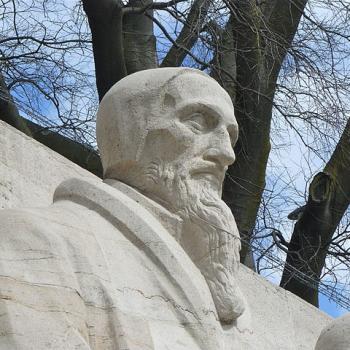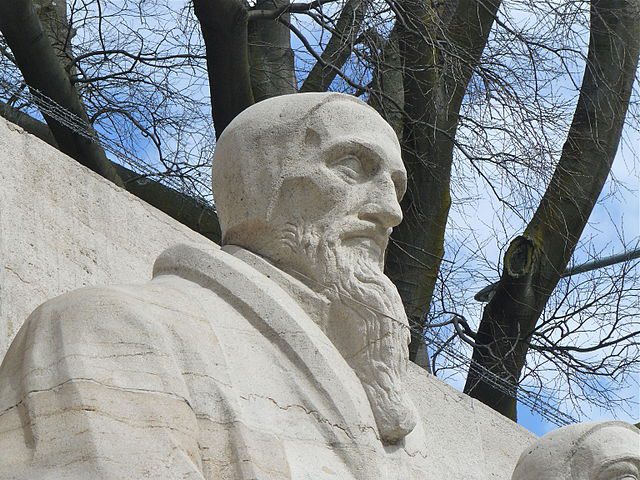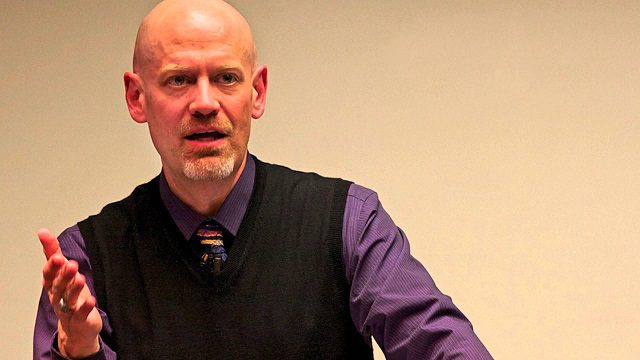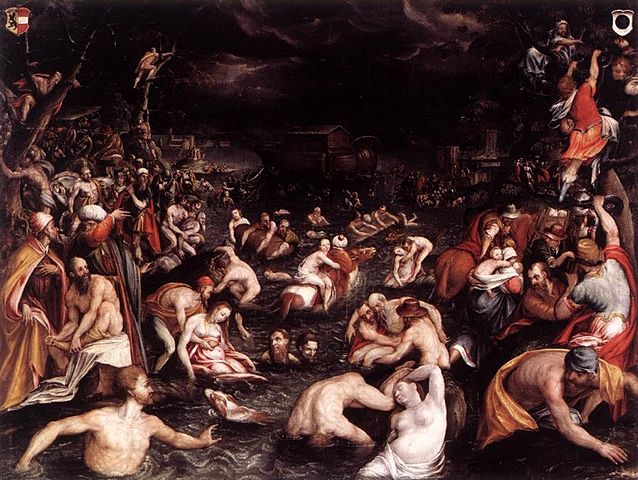
See book and purchase information for this book of mine (2010). This article is taken from chapter 10: pages 73-101.
*****
The Calvinist viewpoint on the fall of man and original sin (tying into the Reformed / Calvinist notion of total depravity) may be observed in the writing of Charles Hodge (1797-1878), the American Presbyterian theologian, in his Systematic Theology (note how he casually assumes that Catholic soteriology is “Semi-Pelagian” and “co-opts” St. Augustine for his side):
The Semi-Pelagian doctrine . . . admits the powers of man to have been weakened by the fall of the race, but denies that he lost all ability to perform what is spiritually good . . . The Augustinian or Protestant doctrine . . . teaches that such is the nature of inherent, hereditary depravity that men since the fall are utterly unable to turn themselves unto God or to do anything truly good in his sight . . .
This want of power of spiritual discernment arises from the corruption of our whole nature, by which the reason or understanding is blinded, and the taste and feelings are perverted. As this state of mind is innate, as it is a state or condition of our nature, it lies below the will and is beyond its power, controlling both our affections and our volitions. (abridged one-volume version, edited by Edward N. Gross [Grand Rapids, Michigan: Baker Book House, 1988], 308; emphasis added)
Hodge cites the example of Job, saying “I abhor myself” (Job 42:6), as an example of “the entire sinfulness of men” and “depravity” (ibid., p. 299), but neglects to mention what God Himself said of Job: “there is none like him on the earth, a blameless and upright man, who fears God and turns away from evil” (Job 1:8; cf. 1:1).
Elsewhere, Hodge is even more explicit:
The fifth form of doctrine to which the Protestant faith stands opposed, is that which admits a moral deterioration of our nature, which deserves the displeasure of God, and which is therefore truly sin, and yet denies that the evil is so great as to amount to spiritual death, and to involve the entire inability of the natural man to what is spiritually good.
. . . The whole human race, by their apostasy from God, are totally depraved. By total depravity, is not meant that all men are equally wicked; nor that any man is as thoroughly corrupt as it is possible for a man to be; nor that men are destitute of all moral virtues. The Scriptures recognize the fact, which experience abundantly confirms, that men, to a greater or less degree, are honest in dealings, kind in their feelings, and beneficent in their conduct. Even the heathen, the Apostle teaches us, do by nature the things of the law. They are more or less under the dominion of conscience, which approves or disapproves their moral conduct. All this is perfectly consistent with the Scriptural doctrine of total depravity, which includes the entire absence of holiness; the want of due apprehensions of the divine perfections, and of our relation to God as our Creator, Preserver, Benefactor, Governor, and Redeemer. There is common to all men a total alienation of the soul from God so that no unrenewed man either understands or seeks after God; no such man ever makes God his portion, or God’s glory the end of his being. The apostasy from God is total or complete. All men worship and serve the creature rather than, and more than the Creator. They are all therefore declared in Scripture to be spiritually dead. They are destitute of any principle of spiritual life. (Systematic Theology, three-volume edition [Charles Scribner and Company: 1871; reprinted by William B. Eerdmans Publishing Co. [Grand Rapids, Michigan, 1940]; Volume II, Part II, Chapter 8, Section 13: “Original Sin”; italics added)
John Calvin wrote in his Institutes of the Christian Religion (Beveridge online translation):
For our nature is not only utterly devoid of goodness, but so prolific in all kinds of evil, that it can never be idle. (II, 1:8)
Here I only wished briefly to observe, that the whole man, from the crown of the head to the sole of the foot, is so deluged, as it were, that no part remains exempt from sin, and, therefore, everything which proceeds from him is imputed as sin. Thus Paul says, that all carnal thoughts and affections are enmity against God, and consequently death (Rom. 8:7). (II, 1:9)
But as those endued with the greatest talents were always impelled by the greatest ambitions (a stain which defiles all virtues and makes them lose all favour in the sight of God), so we cannot set any value on anything that seems praiseworthy in ungodly men. . . . The virtues which deceive us by an empty show may have their praise in civil society and the common intercourse of life, but before the judgment-seat of God they will be of no value to establish a claim of righteousness. (II, 3:4)
[T]he will, deprived of liberty, is led or dragged by necessity to evil . . . if the free will of God in doing good is not impeded, because he necessarily must do good; if the devil, who can do nothing but evil, nevertheless sins voluntarily; can it be said that man sins less voluntarily because he is under a necessity of sinning? (II, 3:5)
None of this can be substantiated from the Bible, which teaches that even unregenerate men are capable of doing “good.” For Calvin, and Calvinists generally speaking, whatever the unregenerate man does, it has to be for a bad motivation. It cannot possibly be a spiritually good thing, or an act intrinsically good. It’s always soiled, corrupted, and perverted.
But that simply doesn’t line up with Scripture or the reality of the human experience or what we can verify even within our own lives before regeneration (and/or Christian commitment and discipleship) occurred.
The contrasting Catholic view is clearly explicated by theologian Ludwig Ott:
The Reformers . . . admitted the reality of original sin, but misunderstood its essence its operation, since they regarded it as identical with concupiscence which corrupts completely human nature . . .
Original Sin does not consist, as the Reformers . . . taught, in ‘The habitual concupiscence, which remains, even in the baptised, a true and proper sin, but is no longer reckoned for punishment.’ The Council of Trent teaches that through Baptism everything is taken away which is a true and proper sin, and that the concupiscence which remains behind after Baptism for the moral proving is called sin in an improper sense only. That sin remains in man, even if it is not reckoned for punishment, is irreconcilable with the Pauline teaching of Justification as an inner transformation and renewal . . .
The wounding of nature must not be conceived, with the Reformers and the Jansenists, as the complete corruption of human nature. In the condition of Original Sin, man possesses the ability of knowing natural religious truths and of performing natural morally good actions . . . Man, with his natural power of cognition, can with certainty know the existence of God. The Council of Trent teaches that free will was not lost or extinguished by the fall of Adam. (Fundamentals of Catholic Dogma [Rockford, Illinois: TAN Books, 1974; originally 1952], translated by Patrick Lynch, 108, 110, 112-113)
Both sides agree generally on original sin: the doctrine that all human beings were affected by the fall of man and fell “in” Adam. It was a corporate rebellion that all of mankind took part in. This can be found in passages such as Psalm 51:5; Romans 5:12-19; and 1 Corinthians 15:22. The dominion of the devil is a result of original sin; it caused a catastrophic cosmic disorder (Gen 3:15; Jn 12:31; 14:30; 2 Cor 4:4; 2 Pet 2:19; Heb 2:14). That’s why theological dissidents (both in the Protestant and Catholic camps) who deny original sin (if not sin itself) invariably deny the existence of the devil (and sometimes even evil itself).
The Gnostic and Manichaean heretics in the early centuries of the Church denied original sin by claiming that the moral corruption of mankind came from an external principle of evil. The Pelagians (who believed in “salvation by works”) taught that the sin of Adam was transmitted not by inheritance but merely by the imitation of a bad example. They thought that death, suffering and concupiscence were not punishments for sin, but natural conditions for mankind, which was created in a pure state of nature.
They denied baptismal regeneration and regarded baptism as a sign only. St. Augustine fought against this, and his views were adopted by the medieval Church. Liberal Protestantism denied it.
Catholics wholeheartedly agree that the unregenerate man is utterly unable to save himself or do the slightest thing to turn to God and be justified or regenerated, but (and always but) for God’s grace. That important topic was dealt with in chapters one and two. That is not our disagreement with Protestantism. There are more than enough differences without creating those that don’t in fact exist.
What we deny is the Calvinist notion of total depravity such that (as Hodge put it), fallen, unregenerate man has “lost all ability to perform what is spiritually good” and that “no unrenewed man either understands or seeks after God.” I shall argue that this runs directly contrary to biblical revelation. The counter to total depravity often hinges upon the nature of biblical poetic language and Hebrew idiom. Calvinists habitually cite Romans 3:
Romans 3:10-12 (RSV, as throughout) as it is written: “None is righteous, no, not one; [11] no one understands, no one seeks for God. [12] All have turned aside, together they have gone wrong; no one does good, not even one.”
It’s necessary for a proper exegesis of this passage is to examine the context of the original citation that St. Paul makes, and also related cross-referenced materials, in order to better understand his intended meaning, within the framework of Hebrew idiom and frequent hyperbole. Paul is here citing the Psalms:
Psalm 14:1-3 The fool says in his heart, “There is no God.” They are corrupt, they do abominable deeds, there is none that does good. [2] The LORD looks down from heaven upon the children of men, to see if there are any that act wisely, that seek after God. [3] They have all gone astray, they are all alike corrupt; there is none that does good, no, not one.
Does the context in the earlier passage suggest that what Paul meant in Romans 3 was “absolutely every person, without exception”? No. Context supports a less literal interpretation. In the immediately preceding Psalm, David proclaims “I have trusted in thy steadfast love” (13:5), which certainly is “seeking” after God. Indeed, the very next Psalm is entirely devoted to “good people”:
Psalm 15:1-5 O LORD, who shall sojourn in thy tent? Who shall dwell on thy holy hill? [2] He who walks blamelessly, and does what is right, and speaks truth from his heart; [3] who does not slander with his tongue, and does no evil to his friend, nor takes up a reproach against his neighbor; [4] in whose eyes a reprobate is despised, but who honors those who fear the LORD; who swears to his own hurt and does not change; [5] who does not put out his money at interest, and does not take a bribe against the innocent. He who does these things shall never be moved.
Even two verses after our cited passage in Psalms David writes that “God is with the generation of the righteous” (14:5). In the very next verse (14:4) David refers to “the evildoers who eat up my people.” Now, if he is contrasting the evildoers with His people, then obviously, he is not meaning to imply that everyone is evil, and that there are no righteous.
Obviously, then, his lament in 14:2-3 is an indignant hyperbole and not intended as a literal utterance. Such remarks are common to Jewish poetic idiom. The anonymous psalmist in 112:5 refers to a good man (Hebrew. tob), as does the book of Proverbs repeatedly (11:23, 12:2, 13:22, 14:14, 19), using the same word, tob, which appears in Psalm 14:2-3.
References to righteous men are innumerable (e.g., Job 17:9; 22:19; Ps 5:12; 32:11; 34:15; 37:16, 32; Mt 9:13; 13:17; 25:37, 46; Rom 5:19; Heb 11:4; Jas 5;16; 1 Pet 3:12; 4:18; etc., etc.). We see Jewish idiom and hyperbole in other similar passages. For example, Jesus says:
Luke 18:19 No one is good but God alone. (cf. Mt 19:17)
Yet He also said:
Matthew 12:35 The good person brings good things out of a good treasure. . . . (cf. 5:45; 7:17-20; 22:10)
Furthermore, in each instance in Matthew and Luke above of the English “good” the Greek word used is agatho. Is this a contradiction? Of course it is not. Holy Scripture is inspired revelation and therefore non-contradictory. Jesus is merely drawing a strong contrast between our righteousness and God’s, but He doesn’t deny that we can be “good” in a lesser sense. Psalm 53 provides a similar example, almost identical to Psalm 14:
Psalm 53:1-3 The fool says in his heart, “There is no God.” They are corrupt, doing abominable iniquity; there is none that does good. [2] God looks down from heaven upon the sons of men to see if there are any that are wise, that seek after God. [3] They have all fallen away; they are all alike depraved; there is none that does good, no, not one.
All the same elements are present: it starts with a reference to atheists or agnostics, then moves on to ostensibly “universal” language, which is seen to admit of exceptions once context is considered. As in Psalm 14, there is the following contrast in the next verse:
Psalm 53:4 Have those who work evil no understanding, who eat up my people as they eat bread, and do not call upon God?
And like Psalm 14, we see other proximate Psalms refer to the “righteous” or “godly” (e.g., 52:1, 6, 9; 55:22; 58:10-11). David himself eagerly seeks God in Psalms 51, 52:8-9, 54, 55, 56, 57, 61, 62, 63, etc. Obviously, then, it is not the case that “no one” whatsoever seeks God. It is Hebrew hyperbole and exaggeration to make a point. We must keep in mind that this is poetic language in the first place. Therefore, it is fairly clear that there are plenty of righteous people to go around.
How about those who “seek God”? Can “none” of those be found, either, according to Charles Hodge’s Calvinist literalistic interpretation (“no unrenewed man . . . seeks after God”)? What do we make of, for example, King Jehoshaphat? Here is a very interesting case study indeed. He was subjected to the wrath of God, yet it is stated that he had some “good” and sought God:
2 Chronicles 19:2-3 But Jehu the son of Hana’ni the seer went out to meet him, and said to King Jehosh’aphat, “Should you help the wicked and love those who hate the LORD? Because of this, wrath has gone out against you from the LORD. [3] Nevertheless some good is found in you, for you destroyed the Ashe’rahs out of the land, and have set your heart to seek God.”
Not only the king, but many people in Judah also sought the Lord:
2 Chronicles 20:3-4 Then Jehosh’aphat feared, and set himself to seek the LORD, and proclaimed a fast throughout all Judah. [4] And Judah assembled to seek help from the LORD; from all the cities of Judah they came to seek the LORD.
How can this be, under Reformed Protestant assumptions of total depravity? Was he (and all these multitudes who “came to seek the Lord”), therefore, regenerate? The text doesn’t say. He hadn’t heard the gospel, though; that’s for sure. Nor had the people of Judah.
According to Hodge and Calvinism generally, no one can do any “spiritual good” (as opposed to a merely natural good or natural moral virtue) whatsoever unless they are regenerated by the Holy Spirit. Were all these people “good men and women”? Did they seek God or not? And how can this be if the passages in Psalms 14 and 53 says that no one does so; “no, not one”?
Was Jehoshaphat himself a “good” man? Various passages state that he was (2 Chronicles 19:4-7, 9; 20:3, 6-7,1 2, 18-21). His reign is described as a good, righteous reign, by and large, but not totally:
2 Chronicles 20:32-37 He walked in the way of Asa his father and did not turn aside from it; he did what was right in the sight of the LORD. [33] The high places, however, were not taken away; the people had not yet set their hearts upon the God of their fathers. [34] Now the rest of the acts of Jehosh’aphat, from first to last, are written in the chronicles of Jehu the son of Hana’ni, which are recorded in the Book of the Kings of Israel. [35] After this Jehosh’aphat king of Judah joined with Ahazi’ah king of Israel, who did wickedly. [36] He joined him in building ships to go to Tarshish, and they built the ships in E’zion-ge’ber. [37] Then Elie’zer the son of Do-dav’ahu of Mare’shah prophesied against Jehosh’aphat, saying, “Because you have joined with Ahazi’ah, the LORD will destroy what you have made.” And the ships were wrecked and were not able to go to Tarshish.
Was King Jehoshaphat regenerated and saved in the end? We don’t know. But if he wasn’t, he couldn’t do any “spiritual good” at all, according to Calvinist theology. The Bible clearly teaches that he did much good; indeed, that he “did what was right in the sight of the LORD” (if that’s not “spiritual good,” what is?). Yet he didn’t destroy the high places, which were idols, and the last thing written about him was that he was prophesied against for joining with wicked King Ahaziah of Israel.
If he was indeed damned in the end, then how does Calvinism account for the spiritual good that can’t be done except by the regenerate (a state, in turn, that cannot be lost, according to Calvinism)? On the other hand, if he was saved, it is only speculation on our part, and he was so without benefit of hearing the gospel, the thing that many Calvinists say is absolutely necessary.
How about King Uzziah? The Bible says he sought God too:
2 Chronicles 26:3-5 Uzzi’ah was sixteen years old when he began to reign, and he reigned fifty-two years in Jerusalem. His mother’s name was Jecoli’ah of Jerusalem. [4] And he did what was right in the eyes of the LORD, according to all that his father Amazi’ah had done. [5] He set himself to seek God in the days of Zechari’ah, who instructed him in the fear of God; and as long as he sought the LORD, God made him prosper.
But Uzziah met an even more tragic end than Jehoshaphat:
2 Chronicles 26:16-21 But when he was strong he grew proud, to his destruction. For he was false to the LORD his God, and entered the temple of the LORD to burn incense on the altar of incense. [17] But Azari’ah the priest went in after him, with eighty priests of the LORD who were men of valor; [18] and they withstood King Uzzi’ah, and said to him, “It is not for you, Uzzi’ah, to burn incense to the LORD, but for the priests the sons of Aaron, who are consecrated to burn incense. Go out of the sanctuary; for you have done wrong, and it will bring you no honor from the LORD God.” [19] Then Uzzi’ah was angry. Now he had a censer in his hand to burn incense, and when he became angry with the priests leprosy broke out on his forehead, in the presence of the priests in the house of the LORD, by the altar of incense. [20] And Azari’ah the chief priest, and all the priests, looked at him, and behold, he was leprous in his forehead! And they thrust him out quickly, and he himself hastened to go out, because the LORD had smitten him. [21] And King Uzzi’ah was a leper to the day of his death, and being a leper dwelt in a separate house, for he was excluded from the house of the LORD. And Jotham his son was over the king’s household, governing the people of the land.
This passage places Calvinists in a tremendous predicament. First, if supposedly no one whatsoever seeks God, how does one explain that the Bible says that King Uzziah did? Secondly, if it is maintained that only a regenerate person can seek God, so that, therefore Uzziah must have been regenerated, then how is his spiritual demise explained?
For Calvinists also hold that one can never lose regeneration or salvation, precisely because God gives it unconditionally (the “U” in TULIP) and His grace is irresistible (the “I” in TULIP) and that the elect always persevere and cannot fall away (the “P” in TULIP). No one can do any spiritual good unless regenerated because of the “T”: total depravity. If Uzziah was saved in the end, again there is no text whatsoever that would indicate such a thing.
2 Chronicles 30:19 also refers to those who can potentially “seek God.” The Apostle Paul casually assumed that it is possible for people to “seek God” in his sermon on Mars Hill to the pagan Greeks (Acts 17:27; cf. James in Acts 15:17). King David in another Psalm (69:32) refers to “you who seek God.” The Bible also refers in many places to those who “seek the LORD”:
Deuteronomy 4:29 But from there you will seek the LORD your God, and you will find him, if you search after him with all your heart and with all your soul.
1 Chronicles 16:10-11 Glory in his holy name; let the hearts of those who seek the LORD rejoice! Seek the LORD and his strength, seek his presence continually! (cf. Ps 105:3-4)
1 Chronicles 22:19 Now set your mind and heart to seek the LORD your God.
2 Chronicles 11:16 And those who had set their hearts to seek the LORD God of Israel came after them from all the tribes of Israel to Jerusalem to sacrifice to the LORD, the God of their fathers.
Psalm 34:10 The young lions suffer want and hunger; but those who seek the LORD lack no good thing.
Proverbs 28:5 Evil men do not understand justice, but those who seek the LORD understand it completely.
Isaiah 51:1 “Hearken to me, you who pursue deliverance, you who seek the LORD; . . .”
Isaiah 55:6 “Seek the LORD while he may be found, call upon him while he is near;”
Hosea 3:5 Afterward the children of Israel shall return and seek the LORD their God, . . .
Amos 5:6 Seek the LORD and live, lest he break out like fire in the house of Joseph, and it devour, with none to quench it for Bethel,
Zephaniah 2:3 Seek the LORD, all you humble of the land, who do his commands; seek righteousness, seek humility; perhaps you may be hidden on the day of the wrath of the LORD.
How can one “seek righteousness” if it is only possible after regeneration, which is a free gift of God, by His decision alone? But in the Catholic view, enough good remains in man even before he is regenerated and justified, to seek to do good (even “spiritual good”), even though no one can begin or seek justification, regeneration, or salvation, because of the doctrine of sola gratia.
We see that it’s Calvinist total depravity that is the unbiblical doctrine. It’s meant to uphold the sovereignty of God (a good motivation, to be sure), but in so doing it does violence to biblical revelation on the nature of man as God made him.
Zechariah 8:21-22 the inhabitants of one city shall go to another, saying, ‘Let us go at once to entreat the favor of the LORD, and to seek the LORD of hosts; I am going.’ Many peoples and strong nations shall come to seek the LORD of hosts in Jerusalem, and to entreat the favor of the LORD. (cf. Jer 50:4)
In fact, many of the people of Judah in the reign of King Asa, determined that anyone who didn’t seek God would be put to death! So what did they do: commit mass suicide, like the Jonestown cult, because no one is righteous, and no one did or could seek God?:
2 Chronicles 15:12-13 And they entered into a covenant to seek the LORD, the God of their fathers, with all their heart and with all their soul; [13] and that whoever would not seek the LORD, the God of Israel, should be put to death, whether young or old, man or woman.
The case of King Asa himself presents yet another difficulty for Calvinists and their sometimes unbiblical doctrines. We see his initial zeal for God (2 Chron 14:11; 15:8-13). We are informed that “all Judah had sought him [God] with their whole desire, and he was found by them, and the LORD gave them rest round about” (2 Chron 15:15). He destroyed idols (15:16) but not the ones in the high places (15:17a), “nevertheless the heart of Asa was blameless all his days” (15:17b). The Bible says here he was blameless “all his days” yet in the next chapter it proceeds to deny this very thing:
2 Chronicles 16:7-12 At that time Hana’ni the seer came to Asa king of Judah, and said to him, “Because you relied on the king of Syria, and did not rely on the LORD your God, the army of the king of Syria has escaped you. [8] Were not the Ethiopians and the Libyans a huge army with exceedingly many chariots and horsemen? Yet because you relied on the LORD, he gave them into your hand. [9] For the eyes of the LORD run to and fro throughout the whole earth, to show his might in behalf of those whose heart is blameless toward him. You have done foolishly in this; for from now on you will have wars.” [10] Then Asa was angry with the seer, and put him in the stocks, in prison, for he was in a rage with him because of this. And Asa inflicted cruelties upon some of the people at the same time. [11] The acts of Asa, from first to last, are written in the Book of the Kings of Judah and Israel. [12] In the thirty-ninth year of his reign Asa was diseased in his feet, and his disease became severe; yet even in his disease he did not seek the LORD, but sought help from physicians.
Does it sound like King Asa was regenerated and saved? Not really; so how could he be “blameless all his days” (2 Chron 15:17)? How could it be said that he ever “relied on the LORD” (2 Chron 16:8)? Even when it is said that “he did not seek the LORD,” it’s apparent that the writer is assuming that it is possible to do so (or else why would it be necessary to point out that one man didn’t, when no one could do so?).
No one says that someone didn’t do something that was impossible from the outset. We don’t say, for example, that “Sam didn’t swim from San Francisco to Hawaii.”
How does one harmoniously interpret all this? It’s really rather simple. We need to always interpret Scripture in context, and understand Hebrew idiom; especially hyperbole, used constantly in Hebrew poetry. Paul was citing Psalms; that is poetry. It cannot always be taken literally.
Even when we look at narratives like the two books of Chronicles, we see that there are exceptions to the rule. And we see that Paul doesn’t even follow his own supposedly all-inclusive, universal statements.
The contradiction lies not in Holy Scripture, but in the erroneous interpretation of Calvinism, superimposing onto Scripture, doctrines that are foreign to it. All “orthodox” Calvinists, by definition, believe in TULIP:
T Total Depravity
U Unconditional Election
L Limited Atonement
I Irresistible Grace
P Perseverance of the Elect
We have already examined many biblical difficulties (by no means exhaustive) of the set of related doctrines known by the acronym, “TULIP,” and will continue to look at many more as we proceed in the next several chapters.
The almost innumerable appearance of “righteous” in the Old Testament itself casts doubt on total depravity. This is not what we would expect if that doctrine were true. The word “righteous” appears in the book of Proverbs 68 times, and “righteousness” 19 times, but we should interpret literally the passage, “there is none that does good, no, not one” (Ps 14:3; cf. 53:3)?
Likewise, in Psalms, “righteous” (in the KJV) appears 65 times, and “righteousness” 47 times. Isaiah has one or other of these words 55 times, Ezekiel: 32, Jeremiah: 13, Job: 16, Ecclesiastes: ten, Daniel: seven, Amos: five, Habakkuk: three, Hosea: two, Lamentations: once, Malachi: twice, Zechariah: once, etc. That’s a total of 346 times in the prophets and the “writings”, not even counting the narratives and the Pentateuch, or the deuterocanonical books (where there are quite a few also).
But the Calvinist will find a few verses of hyperbole and typical Hebrew hyper-exaggerated compare and contrast and conclude that the overwhelming consensus of the other instances must all be interpreted in light of the few: wrongly regarded as literal. They don’t even abide by one of their own supposedly key hermeneutical principles (that is a useful one across the board for all Bible readers): interpret less clear biblical passages in light of more clear related cross-references.
Romans 1 is also heavily used in Calvinist polemics in favor of total depravity:
Romans 1:18-25 For the wrath of God is revealed from heaven against all ungodliness and wickedness of men who by their wickedness suppress the truth. [19] For what can be known about God is plain to them, because God has shown it to them. [20] Ever since the creation of the world his invisible nature, namely, his eternal power and deity, has been clearly perceived in the things that have been made. So they are without excuse; [21] for although they knew God they did not honor him as God or give thanks to him, but they became futile in their thinking and their senseless minds were darkened. [22] Claiming to be wise, they became fools, [23] and exchanged the glory of the immortal God for images resembling mortal man or birds or animals or reptiles. [24] Therefore God gave them up in the lusts of their hearts to impurity, to the dishonoring of their bodies among themselves, [25] because they exchanged the truth about God for a lie and worshiped and served the creature rather than the Creator, who is blessed for ever! Amen.
Yet Paul doesn’t teach, in context, that absolutely all unregenerated men know that God exist but deny Him anyway, for in the very next chapter, Romans 2, he talks about “righteous” people who can do “good” and who are capable of “well-doing” even without the Law, let alone the gospel of Jesus Christ:
Romans 2:6-7, 10, 13-16, 26-27 For he will render to every man according to his works: [7] to those who by patience in well-doing seek for glory and honor and immortality, he will give eternal life; . . . [10] . . . glory and honor and peace for every one who does good, the Jew first and also the Greek. . . . [13] For it is not the hearers of the law who are righteous before God, but the doers of the law who will be justified. [14] When Gentiles who have not the law do by nature what the law requires, they are a law to themselves, even though they do not have the law. [15] They show that what the law requires is written on their hearts, while their conscience also bears witness and their conflicting thoughts accuse or perhaps excuse them [16] on that day when, according to my gospel, God judges the secrets of men by Christ Jesus. . . . [26] So, if a man who is uncircumcised keeps the precepts of the law, will not his uncircumcision be regarded as circumcision? [27] Then those who are physically uncircumcised but keep the law will condemn you who have the written code and circumcision but break the law.
All of this is about Gentiles who don’t even have the law. They haven’t heard the gospel at all. The New Testament has not yet been put together. They (obviously) don’t yet have the benefit of Romans itself. Paul never says that they have heard the gospel. Most Calvinists would probably say they are unregenerate, since they think that one must literally hear the gospel and accept it in order to be regenerated and justified. These people have not that advantage at all. Therefore, according to Calvinism, they could not possibly be capable of any spiritually good thing.
Calvinists hold that any instance of “seeking” of God must occur in the regenerate soul. They have the burden of explaining, then, how all these Gentiles Paul refers to in Romans 2 were blessed with regeneration without hearing the gospel message. They obviously had to be regenerated, according to Calvinism, in order to do all the good things Paul described them as doing, and indeed, to even achieve salvation, as Paul says that they do.
They’re justified, they are moral and “righteous”; they are internally transformed (“written on their hearts” / “conscience” etc.), and saved (“eternal life”). That definitely involves “spiritual good.” They do good works, and God uses these as a prime consideration in granting them salvation.
The Calvinist would have to assume (because of his predispositions) that they, therefore, must have both heard the gospel and have received regeneration. But nothing in the text itself suggests to the slightest degree that the former is the case, and the latter can only be deduced (I think it could rightly be, since they are referred to as being “justified” and saved).
The famous Calvinist preacher and evangelist Charles Spurgeon stated in his sermon, “What I Believe About Regeneration,” the following:
Men are not usually saved without the immediate agency of the gospel. Some have said that the Spirit of God always works through the truth, and that the truth is sure to work conviction. The truth, however, is preached, and faithfully preached, to tens of thousands, to whom it conveys not a blessing at all, but is the savor of death unto death. Others have said that the Spirit of God regenerates men apart from the Word of God but this is not told us in Scripture, and is not therefore to be received.
This teaching (though often true) is in direct contradiction to St. Paul and Holy Scripture, insofar as it is made a universal rule. For where does it say in Romans 2 that these people, who are referred to as saved, heard the gospel? It doesn’t teach that. Some there are clearly saved without the benefit of the gospel, despite Spurgeon’s dubious claim that “this is not told us in Scripture, and is not therefore to be received.”
Romans 1:18 For the wrath of God is revealed from heaven against all ungodliness and wickedness of men who by their wickedness suppress the truth
John Calvin, in his Commentaries, wrote about this verse (second italics are my own):
[I]t hence appears that all were guilty of sacrilege, and of wicked and abominable ingratitude. . . . And then, all the impiety of men is to be taken, by a figure in language, as meaning “the impiety of all men,” or, the impiety of which all men are guilty.
Calvin provides a remarkable example of eisegesis (a fifty-cent word for reading into Scripture something that isn’t there) and of illogical thinking, in the last sentence. Calvin, in effect, modifies the passage in the following fashion:
For the wrath of God is revealed from heaven against the ungodliness and wickedness of all men, all of whom by their wickedness suppress the truth.
See how the meaning changes? Calvin is clearly engaging in circular reasoning and eisegesis. He came to Romans 1 with his theology already in place, and he read into it to make it teach accordingly. But what he does is not in the text itself. Why this is can be examined in several other ways.
I shall contend in due course that it is impossible to interpret this passage in its entirety (i.e., the cited portion above) in accordance with the Calvinist view that it applies to all men. And it’s not all that difficult to prove this, in context. Being a fallen creature and doing particular sinful acts of wickedness are two different things.
The first argument one could put forth is so elegantly simple (though a bit subtle) that it could easily be overlooked:
1) If Paul is referring to fallen man en masse, then he must be referring to all men after Adam and Eve (including the fallen Adam and Eve), since they all would be in this totally depraved, fallen state after the first human couple.
2) In other words, the passage cannot describe post-Adam and Eve man as having been in one state and then having descended into the fallen state (i.e., the totally depraved state of Calvinism’s fancy), because that was already a fait accompli. That sad progression of events had already occurred.
The task remains, then, to determine whether the passage suggests any progression: a thing that is impossible by the nature of things, if it is supposed that it is referring to fallen man throughout, or whether it is discussing something other than man’s fallenness (i.e., particular acts of wickedness and tendencies of many men, but not all men, as fallen, depraved creatures).
I agree with the Calvinist that all men indeed know that God exists (though this knowledge is sometimes very buried in subconscious layers). That is indeed a statement that can apply to all men, without exception. Verse 20 is such a generalized statement, and can be properly interpreted in this way, I think. With verse 21, however, Paul starts discussing actual, particular acts:
Romans 1:21 for although they knew God they did not honor him as God or give thanks to him, but they became futile in their thinking and their senseless minds were darkened.
Now, is this true of absolutely all men (fallen man)? It seems to me that if this is about fallen man per se, then it couldn’t be about post-Adam and Eve man, because we see a progression into fallenness. “Senseless minds” being “darkened” sounds exactly like the depravity that the Calvinist asserts of all fallen men.
Thus, it is a vicious logical circle, because this text is talking about human beings who would already have fallen, as descendants of Adam and Eve. Therefore they can’t fall again. If one falls into a pit that one can’t possibly get out of, then likewise it is impossible to again fall into it. One is already there, and for good. How do we know this? It’s rather simple:
1) Verse 23 says that they worshiped images (idolatry). Adam and Eve didn’t do this.
2) Verses 26 and 27 describe homosexual acts. That doesn’t apply to Adam and Eve, either, and in fact, was impossible because it requires two men or two women!
3) Verse 28: “And since they did not see fit to acknowledge God, God gave them up to a base mind and to improper conduct.” This also reads (for a Calvinist) like a description of total depravity. Calvin seems to strongly imply this in his commentary:
There is an evident comparison to be observed in these words, by which is strikingly set forth the just relation between sin and punishment. As they chose not to continue in the knowledge of God, which alone guides our minds to true wisdom, the Lord gave them a perverted mind, which can choose nothing that is right.
It is the inability to choose anything that is right which is precisely the hallmark of unregenerate, fallen man. They already had this characteristic, as part of the fallen human race. Therefore, it makes no sense for the text to describe post-fallen man as falling. Ergo: the text must not be referring to fallen man en masse (as if all men do these things), but to examples of widespread wickedness and actual sin, not original.
Therefore, the passage cannot be about fallen man because it gives illustrations of “falling” that make no sense if the passage is supposedly about fallen man. If these people are already fallen, they can’t be described as falling again. Calvin (still for v. 28) qualifies slightly, so as to make sense of the text and achieve some semblance of logical non-circularity:
As he had hitherto referred only to one instance of abomination, which prevailed indeed among many, but was not common to all, he begins here to enumerate vices from which none could be found free: for though every vice, as it has been said, did not appear in each individual, yet all were guilty of some vices, so that every one might separately be accused of manifest depravity.
4) Verse 29: “Full of envy, murder, strife, deceit, malignity, they are gossips,”: This has to be after Adam and Eve, since the first murder was Cain killing Abel, after the fall.
5) Verse 30: “disobedient to parents”. Adam and Eve had no parents.
A second argument proceeds as follows:
1) Assume for the sake of argument that Romans is about fallen man en masse.
2) The Calvinist argument will contend that Paul switches back to talking to the Roman Christians in Romans 2 (at some point in that chapter).
3) But the phrase “O Man” of 2:1 implies a continuation of the generalizations about sinful man, as seen in the use of “men” (1:18) and the general “they” and “them” (referring back to this [fallen or example of a wicked] “man”) throughout Romans 1.
4) 2:2 and 2:3 speak of judgment of the same “O Man” (2:3). So these two verses are still talking about fallen, unregenerate man.
5) Yet 2:4 states: “Do you not know that God’s kindness is meant to lead you to repentance?”
6) According to Calvinism, the unregenerate, totally depraved man, who is spoken of as being judged in 2:2-3 is never intended by God to repent unto salvation, because of their belief in limited atonement: Jesus died only for the elect, and only they have been chosen by God from the foundation of the world. The others are inexorably damned by God’s foreordained choice of not electing them to salvation. Therefore, 2:4 would be a contradiction to what came immediately before and after. “Repentance” should not be applied to these unregenerate, wicked men at all. It is meaningless in the Calvinist paradigm. It’s another “Catholic verse”!
7) Verse 5 reiterates that the non-elect, unregenerate man was being discussed in 2:1-4: “But by your hard and impenitent heart you are storing up wrath for yourself on the day of wrath when God’s righteous judgment will be revealed.”
8) Paul then goes on to explain that people are judged in the end by their works, so that the ones described earlier who committed all these evil deeds are obviously among the damned, according to the thrust of the entire passage here considered. So, why, then, is “repentance” used in reference to them, in verse 2:4, when this is a meaningless concept for the damned, according to Calvinism and limited atonement?
9) Therefore, we conclude the contrary: that the passage is not about fallen man or unregenerate man alone, but about a generalized catalogue of human sins, with the “moral” being that those who commit such sins and do not cease will tend to be the ones who are damned in the end.
A third argument is a lexical one concerning the Greek word ago (“lead”) from Romans 2:4: “Do you not know that God’s kindness is meant to lead you to repentance?” Thayer’s Greek-English Lexicon describes ago in this particular usage: “to lead, guide, direct: Jn x. 16.” God is leading the person to repent and be saved.
According to Calvinism, such leading is inexorable (irresistible grace). If God wants to lead someone, they will be saved, and if God wants to pass over the next person, they will be damned. That’s all there is to it. The Amplified Bible brings out the shades of meaning inherent in this passage:
Or are you [so blind as to] trifle with and presume upon and despise and underestimate the wealth of His kindness and forbearance and long-suffering patience? Are you unmindful or actually ignorant [of the fact] that God’s kindness is intended to lead you to repent (to change your mind and inner man to accept God’s will)?
Here is the Apostle Paul speaking hypothetically to the damned, fallen “man” and bringing up the notion of being led to repentance. Why, if there is no chance whatsoever of this person being saved? It doesn’t fit. It’s a square peg in a round hole. The Calvinist God doesn’t “talk” like this to the damned. In the very next verse Paul goes right back to saying they will be damned. But Thayer compares the use here of ago, to another verse:
John 10:16 And I have other sheep, that are not of this fold; I must bring (ago) them also, and they will heed my voice. So there shall be one flock, one shepherd.
This sounds more like Calvinism! God “brings” them and they come; no doubt about it. Calvinists love John 10:14, too, because this is talking about the elect: “I am the good shepherd; I know my own and my own know me.” But Romans 2:4 is just stuck in the middle of all gloom and doom about fallen man. God is unable to lead these sinners by His kindness, to repentance.
It makes no sense: not within the paradigm of Calvinism. Therefore, the Calvinist interpretation of this passage, as exemplified by John Calvin’s exegesis, is implausible and incoherent, on the three grounds I have laid out. The triumphant Romans 8:14 is another use of ago:
Romans 8:14-16 For all who are led by the Spirit of God are sons of God. For you did not receive the spirit of slavery to fall back into fear, but you have received the spirit of sonship. When we cry, “Abba! Father!” it is the Spirit himself bearing witness with our spirit that we are children of God, (cf. also Heb 2:10: “bringing”)
This is election! Catholics don’t deny election itself, or even predestination of the elect; we only deny predestination of the damned, and the notion that any human cooperation whatsoever (derisively called synergism by Calvinists) is somehow Pelagian and a detraction from the glory of God.
The entire passage thus considered doesn’t coherently fit into a Calvinist paradigm at all, but it is perfectly consistent with a scenario not dealing with fallen man en masse, but rather, the sins of men that we can observe, with the final damnation of those who do not repent (back to 2:4 again).
God hasn’t predestined anyone to damnation. It is their choice. God gives grace enough for any man to be saved a million times over. But some reject this grace, just as the fallen angels did, even though they were with God, and so they are damned.
These exegetical arguments are not absolutely airtight (few are that, and I can think of some possible ways they could be defeated), but it seems to be a fruitful line of preliminary argument, with potential, that could be refined and developed with more thought and study. At the very least, I think questions are raised that Calvinists at least need to ponder, and come up with a refutation and alternate explanation.
Calvinists reason: “only God is good; therefore nothing [unregenerate] man does is good.” It’s the old, tiresome “either / or” mentality again. God is absolutely, perfectly good, so man must be a worm, with absolutely nothing good in him, due to this rebellion in the fall.
But Catholics reason: “God is perfectly good; therefore, man is good by His grace.” Calvinists see in that works-salvation. But we’re not denying that man can’t save himself; we’re only denying that he is destitute of any truly good thing whatever before he is regenerated (total depravity). Another way to describe the difference is the following:
1) Catholic: man can only do good by God’s grace. Even unregenerate men can do a measure of good by this grace, but cannot ever be saved in so doing.
2) Calvinist (not even all Protestants): the only man that can do the good that comes entirely by God’s grace is the regenerate man.
The doctrine of total depravity leads to many manifest absurdities. If, for instance, an unregenerate man saves a child from being hit by a car, according to total depravity the act can be neither “wholly good” nor “spiritually good.” It’s good in some remote, multiply qualified sense, so we are told, but it lacks the purity and unmixed nature of the same act performed by a regenerate person.
Moreover, according to John Calvin, “everything which proceeds from him [unregenerate man] is imputed as sin” (Inst. II, 1:9). Such a man is utterly incapable of “charity towards [his] neighbour” and indeed, is “incapable of one righteous desire” (Inst., II, 2:12). Therefore, it follows inexorably by the internal logic of the position, that even an act of this extraordinarily charitable nature is still “imputed as sin” — which is an outrageous assertion indeed.
According to the Bible and Catholicism, and most of Protestantism, and Orthodoxy, on the other hand, if a thing is good, it is good, and ultimately flows from God’s grace. Men (even unregenerate ones) can do these good acts by God’s grace.
At the same time, there are subjective differences in motive, degrees of consent of the will and so forth (which in terms of sin we differentiate by “venial” and “mortal”), but a good act — insofar as “good” is objectively defined — is a good act. A = a.
Lastly, the following passage prove that there is such a thing as a truly righteous man who does righteous, good deeds; yet he can forsake that path and ultimately be lost. According to Calvinism this is untrue and impossible in all aspects: the unregenerate man is totally depraved; therefore can do no “spiritual good” or true righteousness (only the regenerate can); the elect are unconditionally elected; therefore they couldn’t be righteous and then not righteous unto damnation; grace is irresistible; therefore no man who truly possessed it could spurn it; the elect (who alone are righteous) persevere, etc. But nevertheless, the Bible teaches otherwise (facts are stubborn things):
Ezekiel 3:20 Again, if a righteous man turns from his righteousness and commits iniquity, and I lay a stumbling block before him, he shall die; because you have not warned him, he shall die for his sin, and his righteous deeds which he has done shall not be remembered; but his blood I will require at your hand.
Ezekiel 18:21-26 But if a wicked man turns away from all his sins which he has committed and keeps all my statutes and does what is lawful and right, he shall surely live; he shall not die. [22] None of the transgressions which he has committed shall be remembered against him; for the righteousness which he has done he shall live. [23] Have I any pleasure in the death of the wicked, says the Lord GOD, and not rather that he should turn from his way and live? [24] But when a righteous man turns away from his righteousness and commits iniquity and does the same abominable things that the wicked man does, shall he live? None of the righteous deeds which he has done shall be remembered; for the treachery of which he is guilty and the sin he has committed, he shall die. [25] Yet you say, ‘The way of the Lord is not just.’ Hear now, O house of Israel: Is my way not just? Is it not your ways that are not just? [26] When a righteous man turns away from his righteousness and commits iniquity, he shall die for it; for the iniquity which he has committed he shall die.
Ezekiel 33:12-13, 18 And you, son of man, say to your people, The righteousness of the righteous shall not deliver him when he transgresses; and as for the wickedness of the wicked, he shall not fall by it when he turns from his wickedness; and the righteous shall not be able to live by his righteousness when he sins. [13] Though I say to the righteous that he shall surely live, yet if he trusts in his righteousness and commits iniquity, none of his righteous deeds shall be remembered; but in the iniquity that he has committed he shall die. . . . [18] When the righteous turns from his righteousness, and commits iniquity, he shall die for it. (cf. Sirach [Ecclesiasticus] 27:28)
2 Peter 2:20-22 For if, after they have escaped the defilements of the world through the knowledge of our Lord and Savior Jesus Christ, they are again entangled in them and overpowered, the last state has become worse for them than the first. [21] For it would have been better for them never to have known the way of righteousness than after knowing it to turn back from the holy commandment delivered to them. [22] It has happened to them according to the true proverb, The dog turns back to his own vomit, and the sow is washed only to wallow in the mire.
***


























